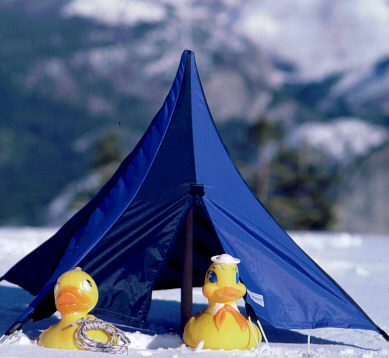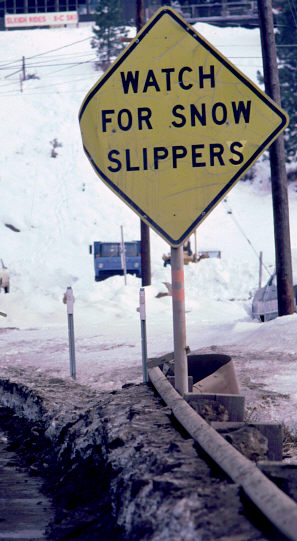Backcountry Skiing: General Info and Disclaimer
| |

|
|
Yvon Canard & friend at home in their Mini-Mid
|
Most of the tours listed at this site are best classified as "ski mountaineering",
and require a
high degree of ski experience as well as general backcountry experience.
A few of the trips require advanced mountaineering experience. Most of these
tours also include some degree of avalanche hazard.
Backcountry ski mountaineering is physically demanding, requires specialized
skills, and it's pretty gear-intensive too. Preparing you
for backcountry ski trips is far beyond the scope of this web site. However, the
following list is a good start. This may seem like a lot of tough prerequesites.
Preparing for backcountry skiing takes years of commitment. But it's worth it.
To me, there is no richer experience than to be on skis in the High Sierra
backcountry.
| |

|
|
Watch for Snow Slippers!
|
- Develop very strong backcountry skills. Do plenty of summer backpacking,
perhaps including some travel far away from trails. Master topo map
reading and compass skills, and never venture into the backcountry without topo map(s)
and a compass.
- You should have very solid ski technique. You should have an efficient
diagonal stride. Be able to make strong telemark and parallel turns. Practice
at downhill resorts, and practice in difficult snow conditions.
A steep remote slope (with a 40-pound pack) isn't the best place to learn ski
technique.
- Get really good at parallel (non-tele) traverse and parallel
(non-tele) sideslip. I know of numerous cases in which friends have taken
dangerous falls, partly because they were using a narrow tele stance on steep icy
snow instead of the more appropriate parallel traverse, which they never learned.
So take some time off from polishing your linked tele turns, and get good at what
you'll sometimes need to survive out there (it may help to practice using fixed-heel
downhill gear). Some telemark "purists" may frown on this. Frown away guys, what I
frown on is serious injuries that happen in the backcountry six hours from 9-1-1.
While you're at it, get really good at steep-hill kick-turns too.
- Sometimes it is safest to take the skis off, so you need to learn the basics of
general mountaineering. Know how to climb and descend steep snow. It isn't just a matter
of strapping pointy things on your feet and walking around; there are important techniques
that must be developed and practiced. Take a class, read books such as Yvon Chouinard's
Climbing Ice,
and practice on safe slopes so you'll be better prepared on the
unsafe slopes.
- Learn and practice ice axe skills, particularly self-arrest.
Self-arrest isn't something that somebody shows you how to do, and
then you know how to do it, no problem. It's something you have to
practice, frequently, from different positions, on different kinds of
snow. You want to find a slope with a good runout and mess around on
it until you really fall, not on purpose, and then do a reliable,
fast, solid self-arrest. Then get up and do it some more. And be
aware that a good self-arrest may not be good enough to save your
life on some kinds of icy and/or steep snow. You should also learn
to do a self-arrest
with your ski pole, quickly, without wasting time removing pole straps (Briefly:
You need to let go of one pole, then grab the other pole below the handle where the other
hand is gripping it, slide the free hand down-pole to the basket, and self-arrest
using the basket end of the pole; do it very quickly before your fall builds too
much speed).
Remember that a pole-arrest is considerably less reliable,
and less effective, than an ice
axe arrest.
- Learn as much as you can about avalanche conditions, including hazard assessment,
risk avoidance, and rescue. Carry and know how to use an avalanche beacon, and carry a snow
shovel and an avalanche probe.
- Maintain excellent cardiovascular and muscular fitness. To get a general idea
of how strenuous a particular tour is, try adding (total mileage / 2) to (cumulative
elevation gain / 1000), and then divide that by the number of days. If the result is above 5-6
(for multiday tours; 7-8 for daytrips), you'll need a pretty strong pace. Can you climb 1000'
elevation in one hour (at 10000' altitude, with a full pack), and then do it again after
lunch, and then again later in the day? If not, plan on doing some of these tours at a
slower pace, with more frequent campsites.
- Get some good gear, never venture out without warm non-cotton
clothes and shell gear, and learn to pack efficiently. To some degree, your life is going
to depend on your selection of clothing, your stove, your shelter, your ski equipment, etc.
Also remember that your traveling comfort and safety will depend to some degree
on the overall weight of the gear that you carry, so spend some extra bucks for
lighter weight gear, and pack smart. Most of the tours listed at this site
require heavy-duty ski equipment including metal-edged skis with rivited-bale
3-pin or cable bindings, nearly-full-width climbing skins, and telemark boots.
- Be prepared for accidents and emergencies. Take a wilderness first
aid course. In particular, learn as much as you can about hypothermia and high altitude
sickness. Before you leave on a trip, leave a detailed itinerary and the phone number
of the appropriate park or forest agency with a friend.
- Be a good judge of your own skills, strengths, and limitations. Going out
on a trip that is too difficult or too strenuous, compared to your own ability or fitness
level, is simply dangerous, and may also be unfair to others on the trip. Talk to the
organizer and other participants in advance if there is any question about whether you
belong on the trip.
- Get some experience. Do lots of daytours. Learn to deal with nasty weather by
going out (prepared) in nasty weather. Take your first backcountry ski trips with others who really know
what they're doing.
And finally, here's one that I consider very important: Have the right attitude.
If you have the attitude of a recreationist, you'll enjoy a few hours of tele
turns. That's not bad, but it isn't enough. With the attitude of an adventurer,
you'll face challenges, endure difficulties, get a few good turns in, and leave
with a memorable experience.
An adventurer's attitude means welcoming the unexpected, rather than whining about it.
Powder and corn are great, but breakable crust is part of the game too.
Getting cold, feeling exhausted, getting slammed by a storm, spending an extra
night out and eating cracker-crumbs for breakfast, if you're prepared and you
think ahead, it won't happen too often, but it will happen. When it does,
remember what John Muir said about finding more than you seek. If you're lucky,
you'll find a lot more out there than just fine views and great skiing.
| |

|
|
John Knoblock cruises the Kuna Crest
|
* * *
The majority of these trips that are at higher elevation (those with an average elevation above
about 9000') are best done in spring rather than winter. This is for several reasons: In
spring, days are warmer and longer, there is less chance of severe storms, and the snowpack
tends to be both easier to manage, and safer (in terms of avalanche conditions). Of course,
there are exceptions: Even in late spring, you can encounter conditions that are nasty, cold,
slow, difficult, dangerous, or all of the above.
Wilderness permits are required for most of these trips, though you are not likely to get
in trouble if you don't obtain one. Unlike summertime, when backpackers must wait in line to
obtain the few permits remaining after the horse companies take their share, wilderness permits
are pretty much available for the asking during winter and spring.
Note: Backcountry skiing has many inherent hazards; the winter and spring backcountry
can be deadly to the unprepared, or to some of the well-prepared who are merely unlucky.
While this web site contains some advice and information about certain ski tours,
you are ultimately responsible for your own safety. I am an enthusiast, not an expert;
I take no responsibility for your safety, so please don't follow blindly in my ski tracks.
Also note that there are a few tours listed on the site that I have not actually
skied myself.
| |

|
|
Slab avalanche just south of Echo Lake, Desolation Wilderness, slide
probably happened 2/17/02.
|
Go to Bob's Sierra Ski Tour Index





